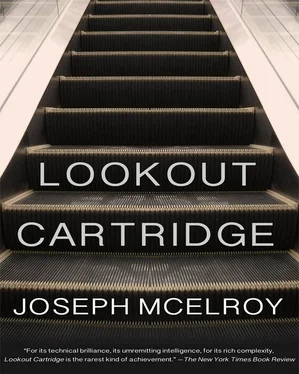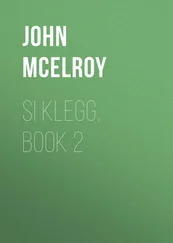Joseph McElroy - Lookout Cartridge
Здесь есть возможность читать онлайн «Joseph McElroy - Lookout Cartridge» весь текст электронной книги совершенно бесплатно (целиком полную версию без сокращений). В некоторых случаях можно слушать аудио, скачать через торрент в формате fb2 и присутствует краткое содержание. Год выпуска: 2014, ISBN: 2014, Издательство: Dzanc Books, Жанр: Современная проза, на английском языке. Описание произведения, (предисловие) а так же отзывы посетителей доступны на портале библиотеки ЛибКат.
- Название:Lookout Cartridge
- Автор:
- Издательство:Dzanc Books
- Жанр:
- Год:2014
- ISBN:9781941088036
- Рейтинг книги:3 / 5. Голосов: 1
-
Избранное:Добавить в избранное
- Отзывы:
-
Ваша оценка:
- 60
- 1
- 2
- 3
- 4
- 5
Lookout Cartridge: краткое содержание, описание и аннотация
Предлагаем к чтению аннотацию, описание, краткое содержание или предисловие (зависит от того, что написал сам автор книги «Lookout Cartridge»). Если вы не нашли необходимую информацию о книге — напишите в комментариях, мы постараемся отыскать её.
Lookout Cartridge — читать онлайн бесплатно полную книгу (весь текст) целиком
Ниже представлен текст книги, разбитый по страницам. Система сохранения места последней прочитанной страницы, позволяет с удобством читать онлайн бесплатно книгу «Lookout Cartridge», без необходимости каждый раз заново искать на чём Вы остановились. Поставьте закладку, и сможете в любой момент перейти на страницу, на которой закончили чтение.
Интервал:
Закладка:
On a table in the balcony room my fingers found a coolness I knew to be a sheet of mica. I had bought some stained sheets cheap and had given Dagger two to try as makeshift insulation under the base of a living-room amplifier that was heating up. A strip of this flexible mica sensitively inserted could have sprung the lock of the front door for me. We had not been reimbursed for Corsica. A god does not think twice about an overdraft, but I thought again about the science-hobby exec Red Whitehead at this moment watching pro football at home in Long Island; my cut from him was small enough, but Nixon’s devaluation which in itself mattered little more to me than to a rich tourist touched off familiar reflections on the cost of living and the rising price of land. There was apparently a cat in the garden scratching in the compost or fishing from the rim of a half-open dustbin. A car engine arrived suddenly on the street side and died and I was through the hall brushing some half-open door on the way and into the living room looking out, but in the street no one moved. Matters were not exactly crystal clear. But they were neither as distant nor as shifting as a week ago. In the dim gleam of the table by the window where I had seen hundred-foot and two-hundred-foot spools and their cans and lids strewn and film cork-screwed everywhere and draping off onto the carpet, my fingertips hit a slender cigar and then picked up a sticky patch, perhaps a dried wine spill Alba had not seen late at night when she was in bed and Cosmo and Dagger were batting around the future of Allende or the death penalty or Ted Kennedy. Across the room in front of the round, carburetor-like slide-projector my hands found the red bowl of Jaffa oranges and soft leathery tangerines, and stiff-stemmed, hard, wax-paper-smooth apples green, yellow, or red, I couldn’t tell, that Alba, with her fear of not having fresh fruit and vegetables, invariably overstocked. My toe hit something heavy, it was the offending amplifier which Dagger had moved down from its stand. I could see he had removed the lattice cover, under which, as I could feel, the tubes were not all bare, some had metal housing over the glass.
Back in the balcony room I lit Krish’s lighter before a large glass-fronted cabinet of shelves. Inside were five cigarette lighters, three flashlights standing like the TNT that had got onto our film in August, a dozen little cigar-packs, and a cubic cache of Kodak and Agfa-35 film. In a lower shelf were four brand-new Japanese lenses in their boxes, four lens-dusting blower-brushes, a few flat yellow boxes of 4X movie film. In the shelf below — and as I bent, my pack slipped up like the yellow air tanks in the Gulf of Ajaccio — was a goodly trove of Beaujolais and Teachers scotch, and in front three Sony 110 tape recorders brand new in their boxes flanked by a stack of cassettes in theirs and a stack of typewriter ribbons in their boxes, a dozen or more.
Which returned me to the living room across from the projector to look behind the turntable on a bookshelf that extended outward at knee-level; there had been a couple of the Nagra tapes there once, but now they were gone. In the dark it may be harder to get angry. I did not know if I was looking successfully forward. Can one be angry about the future? Alba’s curtains were of fine Indian cotton, and the light that came through them sifted out the reds and oranges and purples but left the weave and the print as if on a shadow screen.
When the delicate splitting sound came from the back of the flat I went at once to face it. But in the balcony room I found nothing more than the draft stirring up the papers between the two typewriters across from the glass cabinet on the long work table that was in fact a hollow door. I closed the French windows and retrieved three sheets from the floor and one from the chair seat. A car stopped, but I did not go back where I’d come from to look. I lit Krish’s flame and read a letter evidently from an American telling Dagger they’d been through all this before and if he was willing to take the movie projector right now he could have it for a low low rock-bottom price. The second sheet was a note from Monty Graf under the monogram of a London hotel dated Thursday: “If, as you say, you are counting on Cartwright’s diary to advertise your film, perhaps I should see a piece of it.” Between the lines there was a familiarity: off to see a man in Coventry; back Saturday; Claire unnecessarily worried; Jan in retreat between Art and social life; that little actor’s to blame.
At that instant, like an axis, two sets of sounds joined street and garden: the slam of car doors; the clang of a dustbin lid; a voice I’d heard calling Hey Dag; and a cat’s yowl like an arcing nerve.
On my way to the living room I again hit the open door in the hall and this time slid the pack off onto the floor. On the living-room threshold I heard steps on the stairs, but I continued to the street window and saw, just soon enough to fall away beside the semitrans-parent curtain, a man who was not Cosmo leaning against Cosmo’s white three-wheeler in a heavy pale Faerile sweater, a man who I thought had a heavy, moustached cheer about him like a Games Master or like Dagger’s when he carved up a high roast of PX ribs or ran his motorbike the wrong way up a narrow noontime street in Soho benevolently greeting outraged pedestrian definitions of the law — for Dagger in some highly developed sense of the warning above the bar of a Hebridean pub
Please do not ask for credit
As a refusal often offends
took credit.
When the upstairs bell rang, then rang again, I wondered who would wake the DiGorros. I moved halfway across the living room.
There was the soft crack of a lock. I let myself down onto the couch and the papers crackled in my parka pocket when I curled up in a sleeping position. The hail light went on, and there was a bump of something being deposited on the floor which had to be near my pack which was against the wall by the hall closet. Before the front door closed again and the steps went downstairs, one of the stranger sounds I’ve ever heard came from Cosmo’s voice: it was my name with a question mark.
The objects in this flat might yield the film.
Cosmo and the other went away and I turned off the hall light and went back to Dagger’s table in the balcony room and with Krish’s lighter looked through the letters and bills and notes to himself that Dag had accumulated. There was nothing explicit on the film unless Monty had written the note Thursday of this just-ending week, and Dagger had told the truth, and my diary was advertising a real film, in which event the film existed. But still only in part? The Softball Game. Maybe more. What more? Why more? The 8-mill. cartridge? The one we’d added the night we came back from shooting the air base? The Unplaced Room unmentioned to Claire?
There was too much here: too much between Dagger’s pica standard and Alba’s elite portable; too much between on my left the poster blow-up of Trotsky in his tortoise-shell glasses with a very young man with an open face beside him (as if photographed together when in fact there was a panel line dividing them) and on my right across above the glass cabinet Mercator’s northern and southern hemispheres framed by Alba; too much between (at the balcony end on the far side of the French doors from me) a folded playpen (sandwiched between two suitcases) and (toward the hall door) several thigh-high piles of books and a stack of magazines staggering up from the floor; too much between (at that end of the room) the upright little oblong steel stove (about as high as the book piles) in which Alba (who would not have in her house one of the antique French stoves I’d been peddling) burned smokeless fuel — and (surprisingly yet somehow not awkwardly near the door to the hall) a huge white paper lantern ballooning down from the ceiling.
Читать дальшеИнтервал:
Закладка:
Похожие книги на «Lookout Cartridge»
Представляем Вашему вниманию похожие книги на «Lookout Cartridge» списком для выбора. Мы отобрали схожую по названию и смыслу литературу в надежде предоставить читателям больше вариантов отыскать новые, интересные, ещё непрочитанные произведения.
Обсуждение, отзывы о книге «Lookout Cartridge» и просто собственные мнения читателей. Оставьте ваши комментарии, напишите, что Вы думаете о произведении, его смысле или главных героях. Укажите что конкретно понравилось, а что нет, и почему Вы так считаете.












